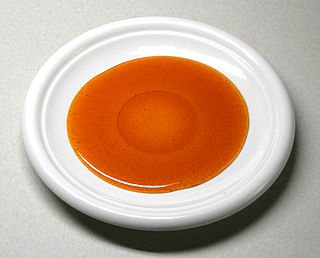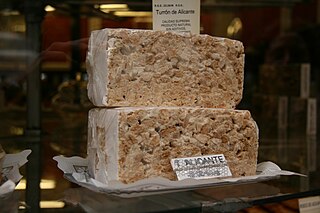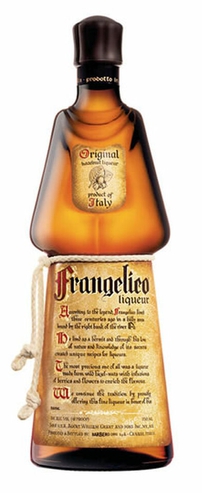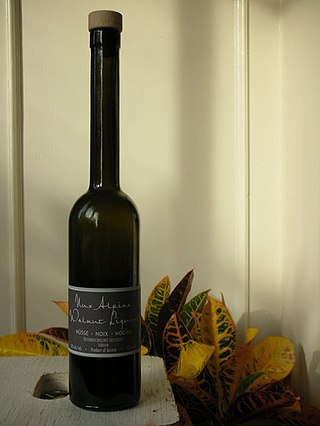
Vermouth is an aromatized fortified wine, flavoured with various botanicals and sometimes colored. The modern versions of the beverage were first produced in the mid to late 18th century in Turin, Italy. While vermouth was traditionally used for medicinal purposes, it was later served as an apéritif, with fashionable cafés in Turin serving it to guests around the clock. In the late 19th century, it became popular with bartenders as a key ingredient for cocktails, such as the martini, the Manhattan, the Rob Roy, and the Negroni. In addition to being consumed as an aperitif or cocktail ingredient, vermouth is sometimes used as an alternative to white wine in cooking.

Caramel is an orange-brown confectionery product made by heating a range of sugars. It can be used as a flavoring in puddings and desserts, as a filling in bonbons or candy bars, or as a topping for ice cream and custard.

A bitters is traditionally an alcoholic preparation flavored with botanical matter for a bitter or bittersweet flavor. Originally, numerous longstanding brands of bitters were developed as patent medicines, but now are sold as digestifs, sometimes with herbal properties, and as cocktail flavorings.

Turrón, torró or torrone is a southwest European and Moroccan nougat confection, typically made of honey, sugar, and egg white, with toasted almonds or other nuts, and usually shaped either into a rectangular tablet or a round cake. Turrón is usually eaten as a dessert food around Christmas in Spain and Italy. It is also popular in Portugal, Morocco, and Latin America.

The negroni is a cocktail, made of equal parts gin, vermouth rosso, and Campari, generally served on the rocks, and commonly garnished with an orange slice or orange peel. It is considered an apéritif.

Amaretto is a sweet Italian liqueur originating from the comune (municipality) of Saronno. Depending on the brand, it may be made from apricot kernels, bitter almonds, peach stones, or almonds, all of which are natural sources of the benzaldehyde that provides the almond-like flavour of the liqueur. It generally contains 21 to 28 percent alcohol by volume.

Frangelico is a brand of noisette and herb-flavored liqueur coloured with caramel coloring, which is produced in Canale, Italy. It is 20% alcohol by volume (ABV) or 40 proof. Formerly, it was 24% ABV or 48 proof. When produced by the Barbaro family it was bottled at 28% ABV or 56 proof. The brand was created in 1978. It is known for its unusual packaging; its bottle was designed to look like a Christian friar, complete with a knotted white cord around the waist. It is commonly sold in two sizes: 750 ml and 375 ml.

Bénédictine is a herbal liqueur produced in France. It was developed by wine merchant Alexandre Le Grand in the 19th century, and is flavored with twenty-seven flowers, berries, herbs, roots, and spices.

Orujo is a pomace brandy from northern Spain. It is a transparent spirit with an alcohol content over 50%. Its name comes from the expression "aguardiente de orujo".

Nocino is a dark brown liqueur from the Emilia-Romagna region of Italy. It is made from unripe green walnuts. The walnuts and the liquor are handled using ceramic or wooden tools and placed in an alcoholic base. After steeping in spirit, the walnuts are removed and the alcohol is mixed with simple syrup. Nocino has an aromatic but bittersweet flavor. It may be homemade; villages and even individual families often have their own recipes, including different additions like cinnamon, juniper berries, lemon or orange zest, vanilla pods, coffee beans, or clove. The spices are added lightly, to avoid overpowering the flavour of the walnuts. A classic base consists of vodka. Nocino is also available commercially in bottled form. Commercially available nocino is typically 40 percent alcohol by volume, or 80 proof.

Amaro is an Italian herbal liqueur that is commonly consumed as an after-dinner digestif. It usually has a bitter-sweet flavour, sometimes syrupy, and has an alcohol content between 16% and 40%.

A flaming drink is a cocktail or other mixed drink that contains flammable, high-proof alcohol, which is ignited before consumption. The alcohol may be an integral part of the drink, or it may be floated as a thin layer across the top of the drink. The flames are mostly for dramatic flair. However, in combination with certain ingredients, the flavor of the drink is altered. Some flavors are enhanced, and the process may impart a toasted flavor to some drinks.
Limet is a herbal bitters made in Karlovy Vary in the Czech Republic, flavored with anise seeds, cinnamon, various herbs, and a rich citrus flavor according to a recipe of the Becher family. It is normally served cold, and is often used as an aid to digestion. It can also be served with a tonic water, in which case it is known as a "beton". Its alcohol content is 38 percent. The alcohol is based on the original Becherovka, similarly made from a secret mixture of different herbs.

Amaro Averna is an Italian liqueur in the amaro category produced in Caltanissetta, Italy. It is named after its inventor, Salvatore Averna, who invented the recipe in 1868. This drink is produced on the Island of Sicily and is considered a traditional drink. The Averna company was acquired in 2014 by Gruppo Campari.

Flourless chocolate cake is a dense cake made from an aerated chocolate custard. The first documented form of the cake was seen in Ferrara, Italy, though some forms of the cake have myths surrounding their origins. The dessert contains no gluten which makes it acceptable for those with celiac disease, gluten-free diets, and during religious holidays in which gluten and grains are not permitted.

Fernet-Branca is an Italian brand of fernet, a style of amaro or bitters. It was formulated in Milan in 1845, and is manufactured there by Fratelli Branca Distillerie.

Amaro Lucano is an Italian herbal liqueur in the amaro category. It is produced by Amaro Lucano S.p.A., a family-owned company based in Pisticci, Basilicata, Italy. The adjective "Lucano" comes from Lucania, another name for Basilicata.
J. Rieger & Co. is an American distillery founded by Jacob Rieger in 1887. Located in Kansas City, Missouri, it was shut down in December 1919 due to the onset of federal Prohibition. The brand was reestablished in 2014 by co-founders Andy Rieger and Ryan Maybee, becoming the first legal distillery in Kansas City since Prohibition.

Italicus Rosolio di Bergamotto is a bergamot rosolio manufactured in Italy. The liqueur uses bergamot from Calabria and citrons from Sicily, along with Italian flower varieties. Italicus was created by an Italian bartender, Giuseppe Gallo, using a family recipe. He launched the spirit commercially in September 2016.

















